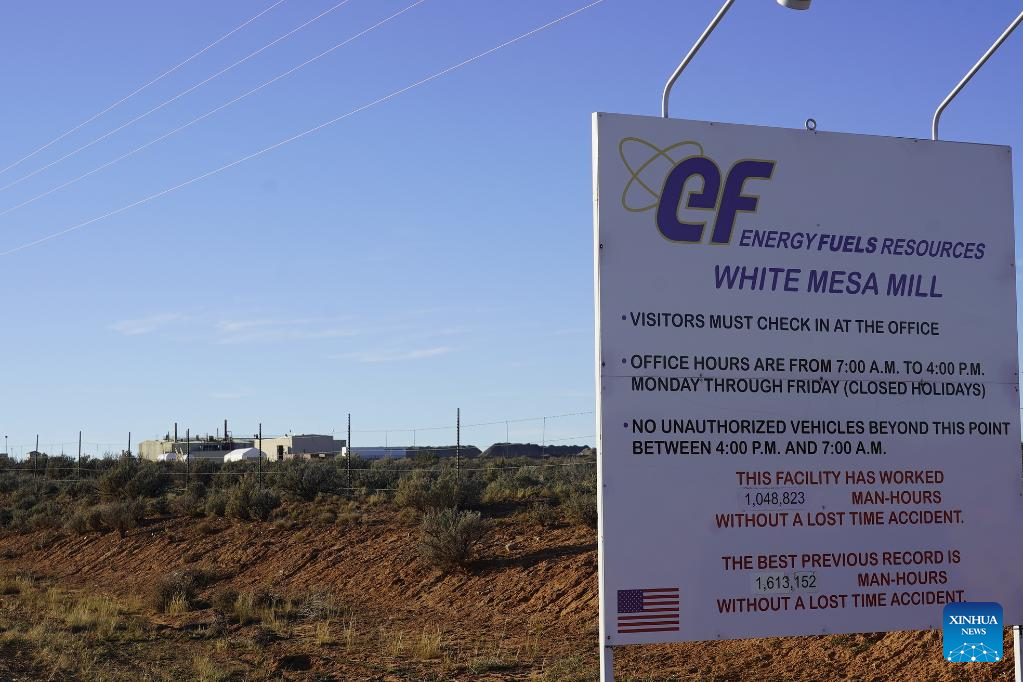
This photo taken on Nov. 11, 2022 shows the White Mesa Mill in Blanding, Utah, the United States. The White Mesa Uranium Mill in southeast Utah, the only operating conventional uranium mill in the United States, has drawn increasing concerns for its impacts on environment and public health.(Photo by Zeng Hui/Xinhua)
LOS ANGELES, Nov. 18 (Xinhua) -- The White Mesa Uranium Mill in southeast Utah, the only operating conventional uranium mill in the United States, has drawn increasing concerns for its impacts on environment and public health.
For 40 years, the White Mesa Mill has processed uranium ore next to the Ute Mountain Ute Reservation in southeast Utah.
A report published by the Grand Canyon Trust earlier this year said radioactive waste from industrial and military facilities are sent there. Only a small amount of uranium is extracted from the waste, the report said, and the leftovers remain at the mill.
"I am concerned about the continued operation of the mill. Even when permanently closed, the tailings impoundments will remain on White Mesa forever," Sarah Fields, program director of Uranium Watch, an environmental group that opposes uranium mining and milling, told Xinhua in an interview.
Fields, who has been working for about 10 years on issues related to the environmental impacts associated with uranium milling in Utah, expressed concerns about the expansion of the White Mesa Mill by the construction of one or two additional tailings impoundments.
"New tailings impoundment will mean the destruction of early cultural resources, which are numerous on the White Mesa Archaeological District. These include kivas, pit houses, food storage structures, burial sites, artifacts, and other evidence of the early inhabitants of Southeast Utah," Fields told Xinhua.
The mill faces vehement opposition by the adjacent Ute Mountain Ute Tribe community of White Mesa living just few miles away.
Local residents have been complaining about health threats to water and air from the mill's toxic containment ponds, radioactive shipping deliveries and smoke stack emissions.
"The school bus commutes children back and forth right next to the mill. The air smells really bad," Michael Badback, a Ute Mountain Ute Tribe citizen in the community of White Mesa, told Xinhua in an interview.
"The wind bring many toxic chemicals. You can smell sulphur," he said.
The 54-year-old lives in a neighborhood with his wife and grandson just a few miles away from the mill. Around 300 people of Ute Mountain Ute Tribe live in the area.
Badback said their drinking water was also polluted. "We don't drink our water. We have to go buy drinking water an hour-and-an-half drive in Colorado. If you leave the water running long enough, it leaves yellow stains in the sink, bowls and bathtubs."
Living next to the mill had led to mental health problems of the White Mesa community, who have their concerns about air quality, the smell from the mill, impacts to vegetation and wildlife, large trucks coming and going from the mill, and other impacts go unaddressed, Fields said.
The Ute Mountain Ute Tribe is in the process of conducting a health evaluation of the community, Badback told Xinhua.
The mill has also impacted the upper aquifer at the site, according to Fields. There will be a lot of attention on the groundwater situation next year as part of the renewal of the Ground Water Permit for the mill.
In recent years, the environmental impacts of renewable energy development have sparked increasing attention and debate.
The planned Thacker Pass lithium mine in the remote north of U.S. state of Nevada, the largest known lithium deposit in the United States, has drawn concerns and protests from environmental groups, Native American tribes and local ranchers.
"Mining is environmentally very destructive and disruptive to nearby communities," John Hadder, director of Great Basin Resource Watch, told Xinhua in an interview.
"This means that the permitting of mines must be done carefully and judiciously and not in the manner done for the proposed Thacker Pass mine. The directly affected communities and the public need to understand the full range of consequences of the proposed mine in order to engage in the permitting process in a meaningful way," Hadder said.
Mining is also a driver of climate change, he said. "It is vital to minimize mining to avoid making the global climate even more unstable."
Hadder urged efforts to reduce demand of materials and energy, and promote tooling for reuse and recycling of new and existing technologies.
The United States needs new mining laws and regulations, Fields noted.
U.S. environmental experts called for developing a vision for a future with a truly just transition to renewable energy sources, without the need for destructive and disruptive mining. ■



